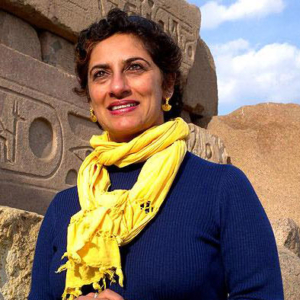 The recently released Netflix docuseries “Alexander: The Making of a God” has captivated audiences worldwide, soaring to second in the Netflix top ten ranking since its January 2024 release. Featured prominently in this project is IFR’s own Salima Ikram, a distinguished archaeologist, author, professor, and prolific media figure whose insights and engaging storytelling brought the enigmatic figure of Alexander to life throughout the six-part series.
The recently released Netflix docuseries “Alexander: The Making of a God” has captivated audiences worldwide, soaring to second in the Netflix top ten ranking since its January 2024 release. Featured prominently in this project is IFR’s own Salima Ikram, a distinguished archaeologist, author, professor, and prolific media figure whose insights and engaging storytelling brought the enigmatic figure of Alexander to life throughout the six-part series.
As part of our ongoing Faces of IFR series, we had a chance to speak to Ikram about Alexander’s timeless appeal, her public engagement work, and reflections from her groundbreaking career.
On Alexander’s enduring appeal
Reflecting on the success of the Netflix series and the widespread appeal of Alexander’s story, Ikram remarks, “How could Alexander not resonate? He’s one of the most romantic heroes going. You know, a young man who was beautiful, bold, heroic, did all kinds of extraordinary things.” She paints a picture of an adventurous and charismatic leader whose daring exploits and tragic fate capture the imagination. “I think that his story has everything… swashbuckling romance, intelligence, warfare, and travel and adventure.”
On her work in the public eye
Reflecting on her journey into public engagement, Ikram emphasizes its impactful nature. In an era where history and archaeology departments are increasingly at risk of shuttering, Ikram sees the media as a powerful tool for combatting this threat. “The media is doing us a great favor by making people increasingly aware of the past and how interesting it is,” she adds, “by having a greater media push, there might be a way of reversing some of these decisions.”
Ikram also stresses the importance of understanding global history for a comprehensive worldview. “To understand the world, you need to understand global history,” she asserts. She sees the media as a means of fostering this understanding, highlighting the significance of documentaries available in many languages. “What’s great is that now you’re getting it in many languages,” she notes, underscoring the importance of accessibility and inclusivity in historical narratives. “Certainly for Egypt and the Middle East, I think it’s been wonderful to have them in Arabic, which is certainly raising more interest and awareness and a sense of belonging to the past.”
On her most memorable discoveries
Reflecting on her fieldwork experiences, Salima Ikram recalls some of her most memorable moments. “I could smell the incense from over two and a half thousand years ago,” she reminisces about excavating a sealed chamber of a burial mound in Sudan, “That was extraordinary. What a privilege.” Another significant moment was during her work in KV63 in the Valley of the Kings, which had been the only tomb found in the Valley since King Tut’s in 1922. “Opening up these sealed jars and excavating inside them and basically trying to put together and understand how mummies were made by an embalming deposit was the coolest thing ever,” she recounts enthusiastically.
On having more than one string in your bow
When asked about advice for aspiring archaeologists, Ikram stressed the importance of versatility, working hard, and a pinch of luck. She highlighted the unpredictability of academic careers and the value of cultivating diverse skills, relaying advice she gives to her own students, “Always have more than one string to your bow.” By remaining adaptable and resilient, they can navigate the field’s challenges and pursue opportunities beyond traditional roles adding, “There are many ways to approach this.”
“Alexander: The Making of a God” can be streamed now on Netflix. To follow Salima Ikram’s other upcoming projects, including worldwide speaking engagements and a forthcoming book, visit her website www.salimaikram.com.

